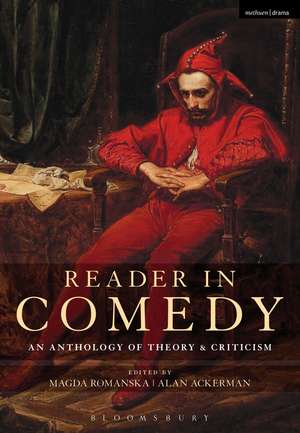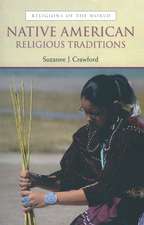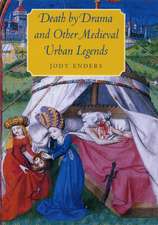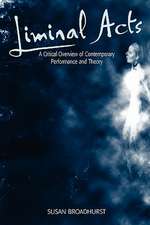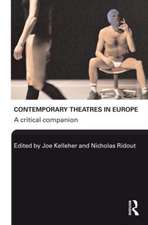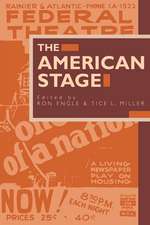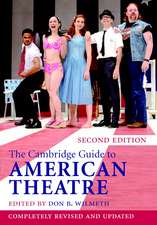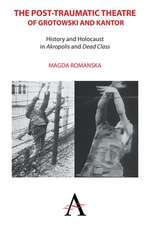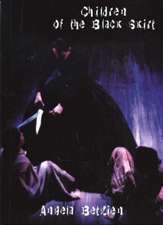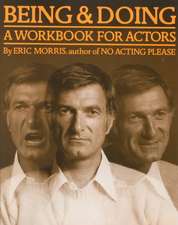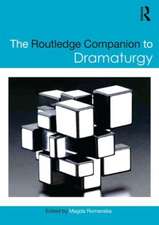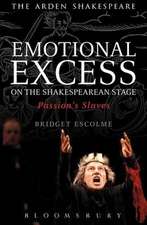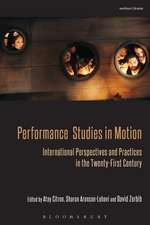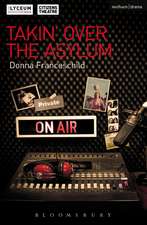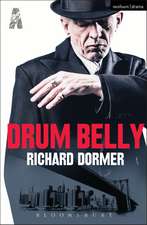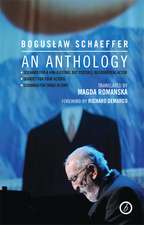Reader in Comedy: An Anthology of Theory and Criticism
Editat de Magda Romanska, Prof. Alan Ackermanen Limba Engleză Hardback – 16 noi 2016
| Toate formatele și edițiile | Preț | Express |
|---|---|---|
| Paperback (1) | 245.36 lei 6-8 săpt. | |
| Bloomsbury Publishing – 16 noi 2016 | 245.36 lei 6-8 săpt. | |
| Hardback (1) | 780.34 lei 3-5 săpt. | |
| Bloomsbury Publishing – 16 noi 2016 | 780.34 lei 3-5 săpt. |
Preț: 780.34 lei
Preț vechi: 1065.61 lei
-27% Nou
Puncte Express: 1171
Preț estimativ în valută:
149.37€ • 162.30$ • 125.55£
149.37€ • 162.30$ • 125.55£
Carte disponibilă
Livrare economică 31 martie-14 aprilie
Preluare comenzi: 021 569.72.76
Specificații
ISBN-13: 9781474247894
ISBN-10: 147424789X
Pagini: 392
Dimensiuni: 169 x 244 x 28 mm
Greutate: 0.89 kg
Editura: Bloomsbury Publishing
Colecția Methuen Drama
Locul publicării:London, United Kingdom
ISBN-10: 147424789X
Pagini: 392
Dimensiuni: 169 x 244 x 28 mm
Greutate: 0.89 kg
Editura: Bloomsbury Publishing
Colecția Methuen Drama
Locul publicării:London, United Kingdom
Caracteristici
Suited to one semester survey courses on comedy as well as more specialised comedy courses owing to the short extracts from so many key writings
Notă biografică
Magda Romanska is Associate Professor of Theatre Studies and Dramaturgy at Emerson College, USA, and Visiting Associate Professor of Dramaturgy and Dramatic Criticism at Yale School of Drama.Alan Ackerman is Professor of English at the University of Toronto, Canada, where he also holds a joint-appointment in the Centre for Drama, Theatre, and Performance Studies. He is the editor of Arthur Miller's Broken Glass (Bloomsbury Methuen Drama, 2011) and since 2005 has served as Editor of the journal Modern Drama.
Cuprins
ACKNOWLEDGEMENTSGENERAL INTRODUCTION CHAPTER 1: ANTIQUITY AND THE MIDDLE AGESINTRODUCTIONTEXTSAncient Views of Comedy 1) Plato, Philebus ("The Basis of comedy is malice") 2) Aristotle on the Origins and Function of Comedya. Poeticsb. "On the qualities of character that are moderate" from Nicomachean Ethics c. Tractatus Coislinianus 3) Horace, "Remarks on Comedy" from Epistles, Satires 4) Quintilian, Institutio oratoria (A.D. 95) Medieval Views of Comedy5) Evanthius, On Drama (ca. A.D. 350) 6) Donatus, On Comedy (ca. A.D. 350) 7) Hrotsvita of Gandersheim, Prologue to the comedies (ca. A.D. 935-972) 8) Dante Alighieri, De vulgari eloquentia (On Eloquence in the vernacular) (1302-1305) 9) Definitions of Comedy (John of Garland, Dante, John Lydgate) 10) Attitudes to the Comic Theater (John of Salisbury, Honorius of Autun, Liuprand of Cremona) CHAPTER 2: THE RENAISSANCEINTRODUCTION TEXTS1) Erasmus, Collected Works of Erasmus (1512) 2) Gian Giorgio Trissino, "Division VI: Comedy", Poetica (1529) 3) Sir Thomas Elyot, , "XII: The Second and third decay of leaning" The Governor The boke named the gouernour / deuised by Thomas Elyot knight(1531) 4) Nicholas Udall, Prologue to Ralph Roster Doister (1538) 5) Thomas Wilson, "Of Delighting the Hearers and Stirring Them to Laughter" fromThe Arte of Rhetorique (1560) 6) George Gascoigne, Prologue to The Glasse of Governement (1575) 7) Stephen Gosson, The School of Abuse: containing a pleasant invective against poets, pipers, players, jesters, etc (1579) 8) Sir Philip Sidney, "Comedy," "Tragicomedy," The Nature of Laughter" from The Defence of Poesie (1595) 9) Ben Jonson, Every Man Out of his Humour (1599) 10) Battista Guarini, Compendium of Tragicomic Poetry (1601) CHAPTER 3: RESTORATION TO ROMANTICISM INTRODUCTION TEXTS1) Samuel Butler, Characters and Passages from Notebooks (ca. 1650) 2) Molière, Preface to Tartuffe (1667) 3) William Congreve, Dedication to The Double-Dealer (1693) 4) John Dryden, Of Dramatick Poesie, an Essay(1668) 5) Aphra Behn "Epistle to the Reader", from The Dutch Lover (1673) 6) John Dryden, "A Discourse Concerning the Original and Progress of Satire" (1693) 7) Jeremy Collier, A Short View of the Immorality and Profaneness of the English Stage (1698) 8) Anthony Ashley Cooper, Third Earl of Shaftesbury, "The Freedom of Wit and Humour" from Sensus communis: An essay on the freedom of wit and humour (1709) 9) Richard Blackmore, Essay upon Wit(1716) 10) Henry Fielding, selections from the Preface to Joseph Andrews (1742) 11) Samuel Johnson, "The Difficulty of Defining Comedy", The Rambler (1751) 12) Oliver Goldsmith, "A Comparison between Laughing and Sentimental Comedy" (1773) 13) Immanuel Kant, "Comparison of the Aesthetic Value of the Various Fine Arts" from Critique of Judgment, 14) Jean Paul Richter, "On the Ridiculous" (1804) 15) William Hazlitt, "On Wit and Humour" (1819) 16) Charles Lamb, "On the Artificial Comedy of the Last Century" (1822) CHAPTER 4: THE INDUSTRIAL AGEINTRODUCTION TEXTS1) Søren Kierkegaard, "The reality of suffering (humor)"; "Humor as an incognito for religiosity"; "Humor - The religiosity of hidden inwardness" from Concluding Unscientific Postscript (1846) 2) W. M. Thackeray, The English Humourists of the Eighteenth Century (1853) 3) Charles Baudelaire, "On the Essence of Laughter" (1855) 4) George Meredith, An Essay on Comedy and the Uses of the Comic Spirit (1897) 5) George Bernard Shaw, "Meredith on Comedy" (1897) 6) Mark Twain, "How to Tell a Story" (1897) 7) Henri Bergson, "Laughter" (1901) 8) Sigmund Freud, "Wit and the Various Forms of the Comic" (1905) CHAPTER 5: THE TWENTIETH CENTURY AND EARLY-TWENTY-FIRST CENTURY INTRODUCTIONTEXTS1) Luigi Pirandello, On Humor (1908, 1920) 2) Virginia Woolf, "Pure English" (1920) 3) Constance Rourke, American Humor: A Study of the National Character (1931) 4) Kenneth Burke, "Comic Correctives" from Attitudes Toward History (1937) 5) Susanne Langer, "The Comic Rhythm" from Feeling and Form (1953) 6) Georges Bataille, "Un-Knowing: Laughter and Tears" (1953) 7) Northrop Frye "Comic Fictional Modes" from Anatomy of Criticism: Four Essays (1965) 8) Jacques Derrida, "From Restricted to General Economy: A Hegelianism without Reserve" from Writing and Difference (1967) 9) Mikhail Bakhtin, "Rabelais in the History of Laughter" from Rabelais and His World (1965) 10) René Girard, "Perilous Balance: a Comic Hypothesis" (1972) 11) Gerald Mast, "Comic Films-Categories and Definitions" from The Comic Mind: Comedy and the Movies (1973) 12) Stanley Cavell, Pursuits of Happiness: The Hollywood Comedy of Remarriage (1981) 13) Mahadev L. Apte, "Sexual Inequality in Humor" from Humor and Laughter: An Anthropological Approach (1984) 14) Linda Hutcheon, A Theory of Parody (1985) 15) Henry Jenkins, "Agee, Mast, and the Classical Tradition" and "Early Sound Comedy and the Vaudeville Aesthetic" from What Made Pistachio Nuts?: Early Sound Comedy and the Vaudeville Aesthetic (1992) 16) Simon Critchley, On Humour (2002) 17) Glenda R. Carpio, Black Humor in the Fictions of Slavery (2008) 18) Michael North, Machine-Age Comedy (2009) 19) Ruth Wisse, No Joke: Making Jewish Humor (2013) 20) Magda Romanska, "Disability in Tragic and Comic Frame" (2015) PERMISSIONS ACKNOWLEDGEMENTSINDEX
Recenzii
Magda Romanska and Alan Ackerman's Reader in Comedy is a well-thought-out anthology that embarks on a challenging enterprise: to provide an overview of theories related to comedy . To help the reader navigate the wide range of texts compiled in this volume, the editors preface each section with generous introductions that provide an overview of the distinguishing characteristics of each period, make perceptive generic comparisons, and point to continuities and discontinuities over time . These introductory pieces help readers identify common trends in the texts collected under each section and explain historically-contingent changes in comic structures. The general introduction, in turn, offers a valuable outline of the book: it explains the provenance of key terms, outlines debates on the role of comedy in particular periods, discusses typical comic plots and character-types, and ends with a brief synopsis of relevant theories of humor and laughter. Combined with the useful bibliographies following each of these prefatory studies, the Reader is an invaluable tool for teachers and students alike.
[The editors] model a clear acceptance of historical shifts in ideas on the function of comedy, providing rigorous contextualization that locates each idea in its moment in time, and makes this a robust and useful primer for Western comedy theory through the ages . A strong collection of foundational texts for those looking to ground themselves in Western scholarship of the comic over time.
Editors Magda Romanska and Alan Ackerman open their book by admitting the difficulty of their tasks: to historicize a genre so diverse in form and style and to define a genre (and its many subgenres) that itself resists definition. Rising to the challenge, the editors of Reader in Comedy: An Anthology of Theory and Criticism have created a temporally expansive analysis of western comic theory. Romanska and Ackerman's collection of theoretical texts tells a story of how comedy and comic theory reflect and influence theatrical and performance conventions, social structures, technology, philosophy, and civic life. It is a substantial anthology that interweaves performance studies, drama, literature, and critical theory. Romanska and Ackerman have curated a collection that charts continuity in comic theory without diluting historical specificities. Each introduction to the chapters succinctly contextualizes the comic theory of its time and also links the annotated texts to previous chapters. Consequently, I would recommend this text for a survey course on comedy and comic theory in the United States and Europe, or to any scholar seeking a broad overview of writings on comedy.
Reader in Comedy is a full, rich and highly informative anthology that can be dipped into time and time again ... For the scholar of comic theory and criticism, this is an extremely valuable reference tool.
Additional readings from important authors, such as Kenneth Burke, Mikhail Bakhtin, Linda Hutcheson and Simon Critchley, makes it a valuable addition to the bookshelf of any scholar or student of comedy.
This is an immense resource covering a lot of ground.
The main benefit of this collection is in presenting these texts together as a starting place for those interested in genre studies ... It would provide a wonderful introduction to those interested in exploring genre across time periods, and for that reason it makes a welcome addition to the Bloomsbury Methuen Drama series.
A much-needed compendium on comedy tracking the narrative arc of the funny bone from Plato to the present day.
This is a comprehensive and thoughtful selection of texts. All of the key theorists are represented and the book's chronological structure is clear. There are useful introductions to each section, as well as a general introduction which offers a worthwhile overview. It is a perfect selection for courses on humour theory and literary humour. [...] In short, it is the best on the market, and the editors are to be congratulated.
Reader in Comedy presents a rich resource in helping students and scholars chronologically organize theories of humor, laughter, and comedy and demonstrates the dialogic nature of humor theories across continents and over centuries as well as the ways in which these theories are so often interrelated.
[The editors] model a clear acceptance of historical shifts in ideas on the function of comedy, providing rigorous contextualization that locates each idea in its moment in time, and makes this a robust and useful primer for Western comedy theory through the ages . A strong collection of foundational texts for those looking to ground themselves in Western scholarship of the comic over time.
Editors Magda Romanska and Alan Ackerman open their book by admitting the difficulty of their tasks: to historicize a genre so diverse in form and style and to define a genre (and its many subgenres) that itself resists definition. Rising to the challenge, the editors of Reader in Comedy: An Anthology of Theory and Criticism have created a temporally expansive analysis of western comic theory. Romanska and Ackerman's collection of theoretical texts tells a story of how comedy and comic theory reflect and influence theatrical and performance conventions, social structures, technology, philosophy, and civic life. It is a substantial anthology that interweaves performance studies, drama, literature, and critical theory. Romanska and Ackerman have curated a collection that charts continuity in comic theory without diluting historical specificities. Each introduction to the chapters succinctly contextualizes the comic theory of its time and also links the annotated texts to previous chapters. Consequently, I would recommend this text for a survey course on comedy and comic theory in the United States and Europe, or to any scholar seeking a broad overview of writings on comedy.
Reader in Comedy is a full, rich and highly informative anthology that can be dipped into time and time again ... For the scholar of comic theory and criticism, this is an extremely valuable reference tool.
Additional readings from important authors, such as Kenneth Burke, Mikhail Bakhtin, Linda Hutcheson and Simon Critchley, makes it a valuable addition to the bookshelf of any scholar or student of comedy.
This is an immense resource covering a lot of ground.
The main benefit of this collection is in presenting these texts together as a starting place for those interested in genre studies ... It would provide a wonderful introduction to those interested in exploring genre across time periods, and for that reason it makes a welcome addition to the Bloomsbury Methuen Drama series.
A much-needed compendium on comedy tracking the narrative arc of the funny bone from Plato to the present day.
This is a comprehensive and thoughtful selection of texts. All of the key theorists are represented and the book's chronological structure is clear. There are useful introductions to each section, as well as a general introduction which offers a worthwhile overview. It is a perfect selection for courses on humour theory and literary humour. [...] In short, it is the best on the market, and the editors are to be congratulated.
Reader in Comedy presents a rich resource in helping students and scholars chronologically organize theories of humor, laughter, and comedy and demonstrates the dialogic nature of humor theories across continents and over centuries as well as the ways in which these theories are so often interrelated.
